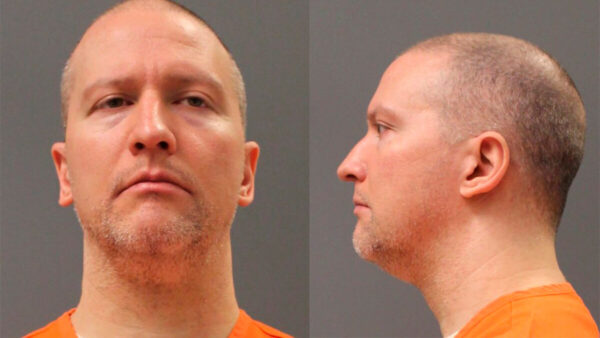A federal inmate was indicted this week in the brutal stabbing of former Minneapolis police officer Derek Chauvin in an Arizona prison library in late November.
John Turscak, 52, faces charges of attempted murder, assault with intent to commit murder, assault with a dangerous weapon and assault resulting in serious bodily injury after Chauvin was stabbed 22 times at the Tuscon Federal Correctional Institution, where he is serving a 22-year term for killing George Floyd by kneeling on his neck for more than nine minutes during a 2020 arrest in Minneapolis.

Turscak, a violent former gang member, is scheduled to appear in court on Jan. 5 to answer to the charges after he told investigators earlier this month that he would have killed Chauvin if guards hadn’t arrived before he was able to finish the job.
The indictment against Turscak, filed Dec. 19, alleges he fashioned a makeshift knife and used it to attack the disgraced ex-cop, leaving him bleeding on the floor of the medium-security prison that’s been plagued in recent years by ongoing security lapses and staffing shortages.
The U.S. District Attorney in Tucson will prosecute Turscak in connection with the brutal attack.
The attack on Chauvin happened the day after Thanksgiving as Floyd was 17 months into his federal sentence for killing Floyd.
First responders had to administer immediate measures to save Chauvins life.
In an interview with the FBI, Turscak revealed that he began thinking about killing Chauvin about a month prior because he recognized Chauvin’s connection to the Floyd case, and saw him as a high-profile target, but it was unclear whether Turscak specifically intended the attack as retribution for Floyd’s death.
He also said he chose Black Friday to attack Chauvin, which he felt would draw a symbolic connection to the Black Lives Matter movement and to the “Black Hand” — a symbol associated with the Mexican Mafia, a powerful prison gang to which Turscak belonged.
At the time of the attack, Turscak was in the midst of serving a 30-year sentence for various crimes he committed while a capo in the Mexican Mafia.
At one point, he became an undercover informant for the FBI, however, the bureau was forced to abandon Turscak as he kept selling drugs and ordering violent crimes during the operation, leading to his current incarceration.
Chauvin has since left the hospital and returned to federal custody in Tuscon while his legal team vowed to get him moved from the facility unless prison officials make serious security upgrades.
Previously, Chauvin’s lawyer, Greg Erickson, complained that Chauvin wasn’t given additional protection due to his status as a high-profile prisoner, alleging jailers “allowed” the stabbing to happen.
“The fact that it happened, and he got stabbed 22 times supposedly under their protection is evidence that they weren’t taking the obligation to protect him serious,” Erickson said.


